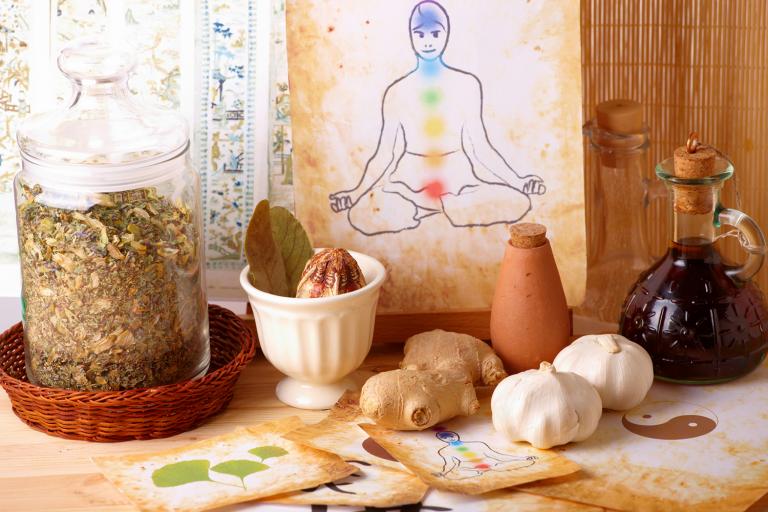Ayurveda has become increasingly popular in the United States in recent years, but it is actually one of the oldest recorded forms of medicine in the world, dating back at least 5,000 years.
What is Ayurveda?
This complex system of medicine encompasses diet and nutrition, herbs, surgery, yoga, philosophy, and other holistic practices and continues to thrive to this day in India, interwoven with modern medicine.
Ayurveda means “the science of life.” Sanskrit poetry comprised sacred volumes of Vedas recording the knowledge of various aspects of healing, written by spiritual leaders and healers. The Vedic texts teach mantras, blessings, rituals, ceremonies, meditation, philosophy, and healing practices.
Ayurveda influenced ancient Greek and Roman medicine, the Buddha, traditional Chinese medicine, the Unani Tibb medicine of Islam, and beyond. Here in the modern West, we focus mainly on its applications in the diet, herbal medicine, yoga and meditation, and healing practices such as abhyanga oil massage, a neti pot nasal rinse, the detoxification practice of panchakarma, and rejuvenation via rasayana.
Ayurveda & the Five Elements
As with most ancient medical systems, Ayurveda is built on the foundation that energy comprises everything in the form of five basic elements: Earth/mass, air/motion, fire/radiant energy, water/cohesive factor, and ether/space.
The three humors of Ayurveda, called doshas, govern a person’s constitution: pitta, vata, and kapha. The dosha indicates the forces within us that are most likely to go out of balance. While we all have a little bit of all three doshas present, usually one or two predominate in an individual. Knowing your dosha helps you choose practices to help pacify these tendencies so you can stay in a better state of balance—the goal being a relative state of equilibrium among the three doshas.
The Doshas of Ayurveda
-
Pitta (Fire/Hot + Water/Damp)
People with this dominant dosha are fiery, of medium athletic build, and tend to show a lot of redness in their face and tongue. They generate body heat and body oil and have strong, driven personalities. Focus on cooling, drying remedies and foods, especially plant foods. Try to keep cool as best you can.
-
Vata (Air + Ether/Dry):
These people are like hummingbirds, lightly flittering from one thing to the next, frequently changing. They’re often thin-framed, tense, nervous, and dry by nature but also fun, social, and creative. Focus on grounding, nourishing, restorative, warm foods and herbs and oils, and make sure to get plenty of rest.
-
Kapha (Earth/Cold + Water/Damp)
These individuals are heavier set with oily skin and thick hair. They have a solid, stable, fluid, calm, and easy-going nature. These homebodies and loyal friends enjoy comfort and relaxation. Warm, light, aromatic, dry foods and herbs benefit them best, helping them to avoid getting too sluggish.
Popular Herbs in Ayurveda
Many herbs are employed in the practice of Ayurveda. These few are some of the herbs of Ayurveda that have attained the most popularity in the US.
-
Triphala
This blend of three fruits–haritaki, amalaki, and bibhitaki–helps balance all three doshas as a general tonic that particularly supports gentle detoxification through the colon and offers nutrition. It is one of our best long-term, safe herbs to ease constipation.
-
Ashwagandha (Withania somnifera)
This building, warming tonic provides the strength and stamina of a stallion if consumed regularly and is often used as a male reproductive tonic, though women can take it as well. Quite a bit of modern research supports its ability to improve mood, sleep, energy, and resilience against stress.
-
Tulsi (sanctum)
Also called holy or sacred basil, this herb is warming, aromatic, and airy. It reduces inflammation, improves digestion and immune health, balances blood sugar, reduces stress, and brightens and calms the mind. It makes an excellent tea.
-
Turmeric (Curcuma longa)
Well-known as a super spice with antioxidant and anti-inflammatory properties, turmeric warms, dries, and lightens the body. It supports detoxification via the liver, heart health, and digestion.
Additional popular herbs from Ayurveda include the bitter, cooling, drying brain tonic; the vegetal, cooling connective tissue-healing, circulation-enhancing, brain tonic gotu kola; the aromatic, fat-clearing resin; the spicy-pungent, anti-inflammatory seed nigella; and the moistening, nourishing women’s reproductive tonic.

